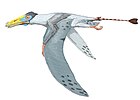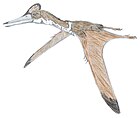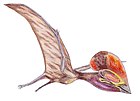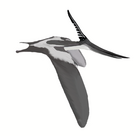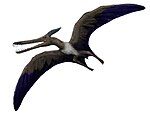Targaryendraconia
Appearance
| Targaryendraconians Temporal range: Hauterivian-Cenomanian,
| |
|---|---|
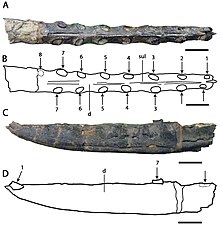
| |
| Mandible of Targaryendraco | |
| Scientific classification | |
| Domain: | Eukaryota |
| Kingdom: | Animalia |
| Phylum: | Chordata |
| Order: | †Pterosauria |
| Suborder: | †Pterodactyloidea |
| Clade: | †Ornithocheirae |
| Clade: | †Targaryendraconia Pêgas et al., 2019 |
| Subgroups | |
| |
Targaryendraconia is an extinct clade of lanceodontian pterosaurs that lived from the Early to Late Cretaceous period in Europe, North America, South America, and Australia.
Classification
[edit]Below is a cladogram following a topology by Pêgas and colleagues in 2019. In their analysis, they recovered Targaryendraconia as the sister taxon of the clade Anhangueria, both of which are within the more inclusive group Ornithocheirae. Targaryendraconia is split into two families: the Targaryendraconidae, which contains Aussiedraco, Barbosania, and Targaryendraco, and the Cimoliopteridae, which contains Aetodactylus, Camposipterus, and Cimoliopterus.[3]
| Ornithocheirae |
| ||||||||||||||||||
References
[edit]- ^ a b Myers, Timothy S. (2015). "First North American occurrence of the toothed pteranodontoid pterosaur Cimoliopterus". Journal of Vertebrate Paleontology. 35 (6): e1014904. doi:10.1080/02724634.2015.1014904. S2CID 86099117.
- ^ Rodrigues, T.; Kellner, A. (2013). "Taxonomic review of the Ornithocheirus complex (Pterosauria) from the Cretaceous of England". ZooKeys (308): 1–112. doi:10.3897/zookeys.308.5559. PMC 3689139. PMID 23794925.
- ^ a b Rodrigo V. Pêgas, Borja Holgado & Maria Eduarda C. Leal (2019) On Targaryendraco wiedenrothi gen. nov. (Pterodactyloidea, Pteranodontoidea, Lanceodontia) and recognition of a new cosmopolitan lineage of Cretaceous toothed pterodactyloids, Historical Biology, doi:10.1080/08912963.2019.1690482



